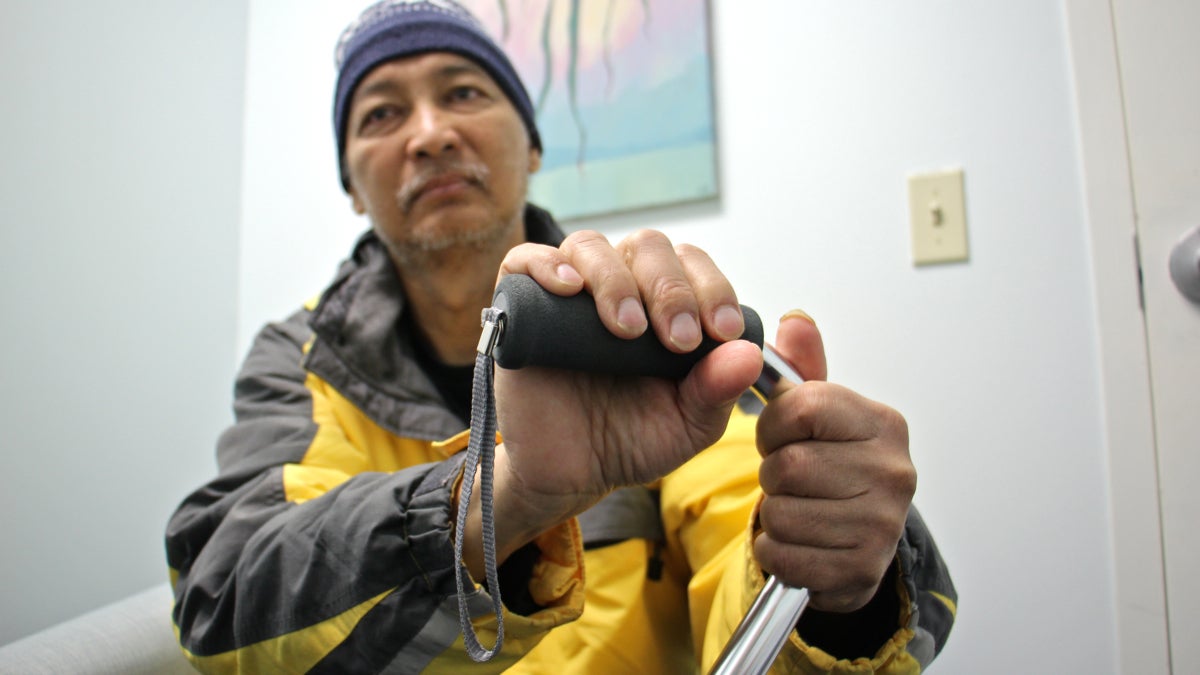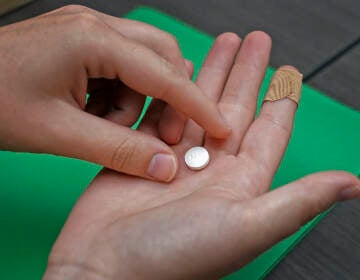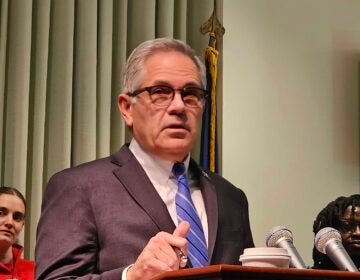Ody: Returning to Indonesia 15 years later, and nearly blind
Listen 4:51
Ody, from Indonesia, is losing his sight because of diabetes and is caught in a vicious cycle. He cannot work because of his blindness and can't afford the medical care that would restore his sight. (Emma Lee/WHYY)
“Life, unauthorized” is a series from WHYY/NewsWorks that looks at the personal immigration stories of individuals who are living in the Philadelphia region without legal status.
—
Ody, 53, from Surabaya, Indonesia
Since he was a child, Ody dreamed of coming to the United States like his grandfather did in the 1960s. “‘It’s a big, big country — a modern country. Everything [is] good over there,'” he remembers his grandfather telling him.
In 1998, when the financial crisis swept through Asia, Ody lost his job as a credit analyst at a bank. “Every bank closed, so we lost the job. … My wife also. So we don’t have no more income,” he said. The same year, Indonesia’s authoritarian president resigned after three decades, creating a power vacuum.
Four years later, Ody said members of his political party were accused of corruption, and those associated with it were being arrested. Members of the party helped him flee to the United States, but his wife opted to stay behind with their two sons.
Ody landed at John F. Kennedy International Airport in 2002 with a tourist visa. When it expired, Ody said a judge granted him “withholding of removal,” a temporary status for immigrants who have suffered or fear persecution in their home countries. After nearly three years, realizing that attempting to maintain his legal status could take a lot of money and time, Ody continued to stay the U.S. illegally.
Ody has lived in the country for 15 years, mostly in Philadelphia. He’s held down a variety of jobs — constructing wooden trusses and panels for a construction company, manufacturing batteries for airplanes, cooking in a Chinese restaurant, and, most recently, working as an attendant at a laundromat. All the while, Ody said, he has been sending money back to his family in Indonesia.
One day last July, Ody suddenly felt dizzy. He called 911 and was taken to the emergency room at Jefferson Hospital, where he was treated for complications from diabetes. The following month, his vision became blurry — first in his left eye; then in his right.
“In October … I inject too much insulin, so I get low sugar,” he said. “When the workplace find me, they feel as if I’m dead already, because I cannot wake up.”
Not long after that, Ody’s boss at the laundromat fired him because he could no longer see well enough to work.
Now Ody is mostly blind, but he cannot afford the surgery he needs to treat his diabetic eye disease. The procedure would cost about $17,000, according to Donna Backues, an outreach worker with the Southeast Asian Mutual Assistance Association Coalition (SEAMAAC) which has been helping Ody. Backues said he has applied several times for emergency medical assistance — a government program that helps immigrants pay for emergency care, regardless of their status — but has been denied because the condition is not considered life-threatening. However, he has received assistance to pay for insulin.
Out of options, Ody is preparing to return to Indonesia. Members of his mosque are raising money to buy him a one-way ticket.
But the decision was not an easy one. Indonesia is in the midst of a corruption scandal that has left millions of residents without government identification, so it could be months before Ody can get the I.D. he needs to apply for health insurance. It also means Ody will need to rely on his brother, sister, and two sons — he and his wife are divorced — and he fears becoming a burden on them. “It’s very sad,” he said. “Every night, I only cry and talk to my god. I hope [going] there will change my life and then, come back healthy to [be] useful for people.”
In his own words: On returning to Indonesia and seeing his sons, now adults:
“Before I plan the first flight to [the] United States, we play together couple days, and then we swim together, everything. We eat together. But when we go home Sunday night, I have to go in the Monday morning, nobody wake up for me. I just kiss both my son. I just kiss them, you know. But right now, I have to come back with my condition like that, you know. I try to [be] strong, you know, but [it’s] very hard for me. … They will [be] sad also when they see me like that, and then I cannot do nothing. … [It’s like] you have enemy in the war, but you don’t have a weapon for win the war.”
WHYY is your source for fact-based, in-depth journalism and information. As a nonprofit organization, we rely on financial support from readers like you. Please give today.




